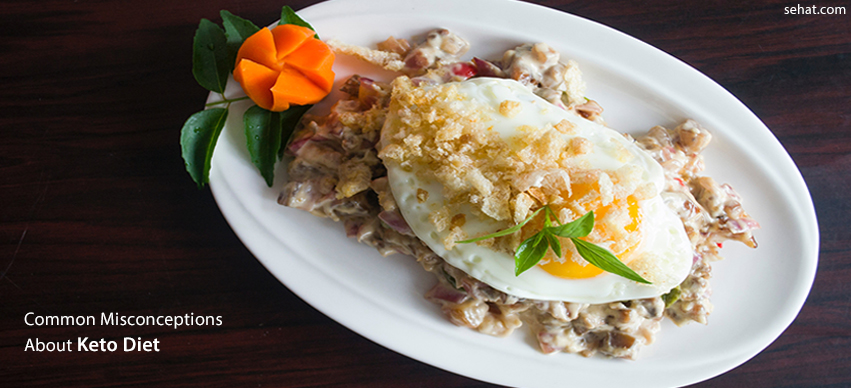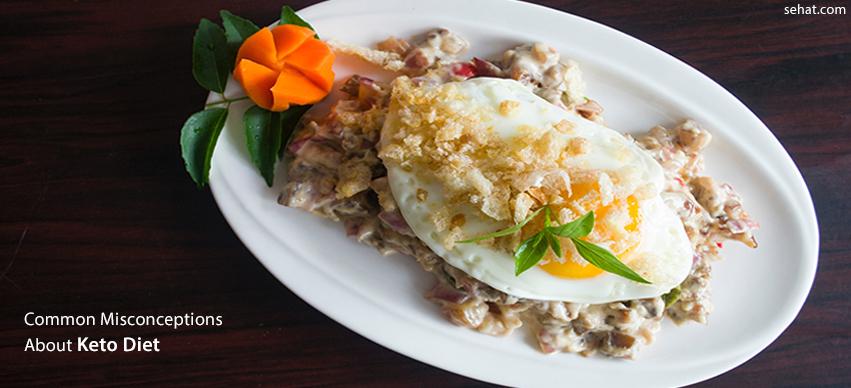What is Tempeh? Nutrition, Health Benefits, How to eat
4 Min Read


With the rise in popularity of the Ketogenic diet, there is also a rise in misconceptions about the keto diet in general. If you’ve been following the keto diet for a longer period, you can probably feel what is true and what isn’t. But, if you are new to the subject and you are just thinking of starting, reading all that conflicting information could confuse you and make you give up on the whole idea of trying out ketogenic eating style. That’s why we are here to clear the air! We will cover the seven most common misconceptions out there, which will hopefully solve dilemmas and disprove common myths.
One of the most common misconceptions is the claim that we have to supply our body with carbs regularly because our brain requires glucose (sugar) to function properly. A study, among many others, has shown that when both ketones and glucose are present and available as fuel for the brain, there is a decrease in brain glucose uptake which states that ketones are the brain’s preferred fuel.
It is also true that there is a very small need of glucose for the brain to function, but that is easily supplied both from the small number of carbs you are getting from the veggies, and if that’s not enough, from protein intake (through the process of gluconeogenesis, which converts protein to glucose).
You may have also stumbled upon some articles stating that you can use any sweetener to replace sugar while on keto.
According to most recent research, only a handful of sweeteners and sugar substitutes out there that are safe and keto-friendly, like Stevia, Monk Fruit, Allulose, and Erythritol. They have been shown not to impact blood glucose and insulin levels at all, and that’s one of the most important things to look out for in a low-carb diet like keto.
You can read more about keto sweeteners here.
On the other hand, there are also a lot of them that could be just as bad as table sugar. Fructose (high fructose corn syrup), maltitol (sugar alcohol), Acesulfame-K, Aspartame are just a few examples. But at the end of it all, using sweeteners on a daily basis all day long is not a real solution. It’s ok to use them sparingly from time to time to satisfy your sweet tooth, but it is not a means of replacing sugary and sweet things all together. And if you do keto the right way for a longer period, your sugar/carb cravings will go way down anyway.
A lot of people also confuse the ketogenic diet with it being a high-fat, high-protein diet. Keto is actually a high-fat, low-moderate protein diet, or to be more precise, a standard Ketogenic diet’s macros are 80% fat, 15% protein, and 5% carbs.
It would indeed be an unhealthy way of eating if it was both high-fat and high-protein because a high protein intake eventually turns a part of that protein into carbs via the process we mentioned earlier (gluconeogenesis).
When you consume more protein than your body requires some of the protein’s amino acids turn into glucose, which can, in turn, raise blood-glucose and insulin levels. And with insulin being a fat-storing hormone, insulin combined together with high amounts of dietary fat is not the best idea.
Until recent times, we have been taught that high-fat diets are bad because they increase our cholesterol levels, and cholesterol is increasing cardiovascular risk factors. But, our ideas about cholesterol and fats have been completely reversed in most recent years, mainly through new, more thorough studies on the subject.
Cholesterol has been vilified over the years, but it actually serves a large number of important roles in the body. It is a critical structural element in tissues such as our nervous system and our brain. And just to show an example, a study has found that higher saturated fat intake and higher cholesterol levels than “normal†are connected with better mental function in older people. A study from 2016 has also shown that people following a low-carb, high-fat diet have better cholesterol numbers and have a lower risk of heart disease.
The terms ketoacidosis and ketosis are actually very different. Nutritional ketosis is achieved by following a properly-formulated, healthy, low-carb ketogenic diet. It’s simply the process of having constant normal insulin levels and using ketones for energy, which are the by-product of burning your own stored fat. And unless you are a diabetic and already have very low insulin levels, it is perfectly safe and healthy.
Now, ketoacidosis happens if there is a lack of insulin in the body. Without the presence of insulin, blood sugar rises to dangerously high levels, and stored fat flows from the fat cells (which results in abnormal production of ketones). This combination of high blood sugar and high ketone levels can upset the acid balance in the blood, and that way becomes dangerous. So again, unless you are a diabetic and already have insulin issues, this will never normally happen.
Constipation is actually a common side-effect in any diet (including keto) if there is a deficiency in certain nutrients or fiber. Fiber is essential for keeping your intestinal system running as smooth as possible. It basically allows more water to sit in your stool, making waste softer and making it way easier to pass through your gut.
And following a well-balanced, healthy ketogenic diet includes consuming a good amount of high-fiber, dense-nutrient veggies every single day. Such examples are broccoli, brussels sprouts, avocado, cabbage, kale, swiss chard, etc. So, if you happen to be suffering from constipation on keto, try consuming more of these fiber-rich veggies daily, and we promise you will have no such problems in the future!
It doesn’t mean that if you go keto you will never be allowed to drink alcohol again. If you are just starting out, it’s true that you should avoid carbs (including alcohol) all together until you get fat-adapted. Consuming carbs over the limit (20 grams daily) too early can prohibit you from ever reaching ketosis and fat-adaptation. But, once you are fully fat-adapted, you can slowly increase your carb-intake by a little bit (up to like 50 grams of carbs daily, depending on your metabolism) and have a glass of alcohol from time to time if you have to.
Just note that many alcoholic drinks are very carb-heavy (like regular beer and various cocktails), and they will completely kick you out of ketosis, so if you really need to, make sure to go for a low-carb drink like a hard liquor (vodka and gin are the best choices), dry white wine, or a low-carb beer.